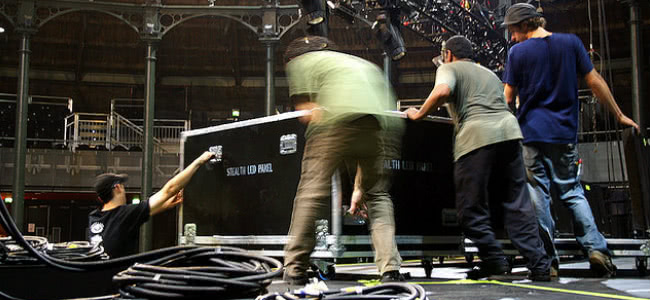Some months back, Tone Deaf reported on a study which revealed the truth about working in the Australian music industry. While it’s an industry driven by many passionate people motivated by their love of music, it can also often be a field rife with mental illness.
The study found that cases of depression and work dissatisfaction were rife behind the scenes and according to a new study by Help Musicians UK, it now seems things may not be so easy for the performers either. According to their research, over 60 percent of musicians have suffered from depression or other psychological issues.
Of these, 71 percent of respondents cited touring as the main issue affecting their mental health. It’s not so surprising, the past few months have seen several cases of musicians leaving famous bands for mental health reasons, including Zayn Malik of boy band One Direction.
“The classic image of a touring musician would seem counterintuitive to all we know about well-being,” Isabella Goldie of the Mental Health Foundation tells The Guardian. “Drinking in moderation, avoiding drugs, getting sufficient amounts of sleep, and having a support base of close friends and family nearby.”
“These are the bonds that help keep you grounded… It’s no surprise that some musicians struggle.” As Grammy-nominated producer Mat Zo puts it, “Ninety-nine per cent of touring is the airports, the hotels, sitting in a metal tube for up to 16 hours at a time.”
“It’s easy to let your mind and body slip into decay, even for a person with a healthy emotional state. For those with anxiety, hotel rooms are like prison cells,” he adds. Meredith Graves, frontwoman of Syracuse punk outfit Perfect Pussy, agrees.
“We’re the luckiest people in the world to be able to do this; but that doesn’t mean it’s not hard. It’s psychologically taxing,” she says. “Being confined to the van for a 10-hour drive… You can’t sleep, you can’t move, you can’t do anything. It’s like a recipe for a breakdown for me.”
Many performers also struggle with the extreme highs of a successful performance and the anti-climactic low that can follow. There’s even a name for it, “post-performance depression’ or PPD, and it’s something mental health professionals are taking seriously.
“When the body experiences major shifts in mood, it is flooded with several different neurotransmitters, resulting in a biochemical release that leads to a feeling of ecstasy,” says mental health professional John C Buckner.
“After these moments the nervous system needs time to recalibrate itself to prepare for another release. After an exciting performance the body starts to balance out the level of neurotransmitters, and therefore it is not releasing the same level that caused the exciting feelings, resulting in the lingering sadness.”
“There was a lot of tension, because I’m thinking to myself, ‘I don’t deserve this, I’m a big star.’”“In normal day-to-day life, biochemicals are released and rest/recovery follow, causing the typical ups and downs of life. In the case of PPD, the process is more extreme with higher highs and lower lows.”
“Musicianship remains one of the most exalted job roles and each live performance can provide a real high which can be hard to adjust to – especially when the elevated status that musicians receive is suddenly lost,” says Goldie.
It can be even harder for musicians who are yet to reach a level of success where they can leave their day jobs. As former XL Recordings artist Willis Earl Beal recounts, coming back to a 12-hour work day after months of touring contributed to the dissolution of his marriage.
“Touring can be destructive on a musician, it was destructive on me, that’s for sure,” he tells The Guardian. “I’d come home from tour, and I’m back to feeding the cat. My wife at the time – I don’t have a wife now – worked 12-hour shifts , so I was cooking the dinner all that sort of shit.”
“There was a lot of tension, because I’m thinking to myself, ‘I don’t deserve this, I’m a big star’ and that was one of the contributing factors in ending my marriage. This fucking career, the striving towards something that never existed and doesn’t exist.”
[include_post id=”437209″]
UK singer-songwriter Kate Nash, who rose to fame while still in her teens, says she struggled with feeling alienated from loved ones back home, citing the contrast between her life and tha tot her friends. “I was still living in a tiny bedroom at my parent’s house,” she says.
“Your friends are studying and you’re doing something very different. Even though that’s exciting, you can feel lost. You’re young and you’re not taking a normal path.” Mat Zo agrees, saying, “Your problems and cares become radically different to the other people in your life.”
“Touring institutionalises you and it can make normal life feel mundane,” says Vaccines singer Justin Young. “You end up with a lot of expectations from life that aren’t always fulfilled in everyday tasks like going down the shops for a pint of milk or even going for dinner with friends. It’s hard to replace all that adrenaline.”
Nash agrees: “When you’re on tour, you know exactly what you’re doing and what’s required of you. There’s a routine. It’s tangible what you stand for because it’s right in front of you. You come off tour and you’re like, ‘Fucking hell what is the point? What am I doing with my life?’”
But according to Goldie, treating touring as escapism is not healthy in the long-term. “Life on the road can be exhilarating but it is vital that the musician has a place to call home, a place where he or she belongs,” she says.




































